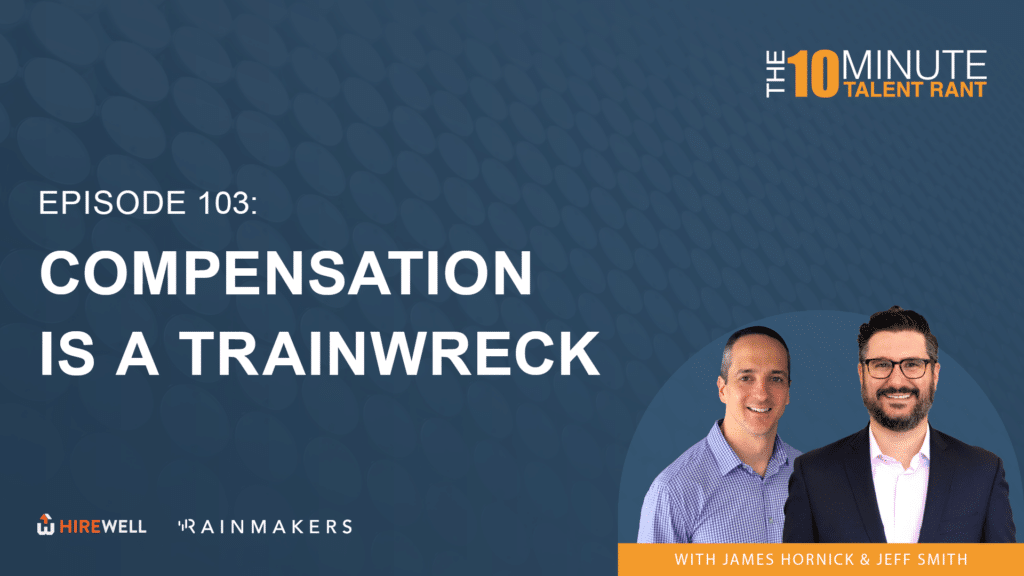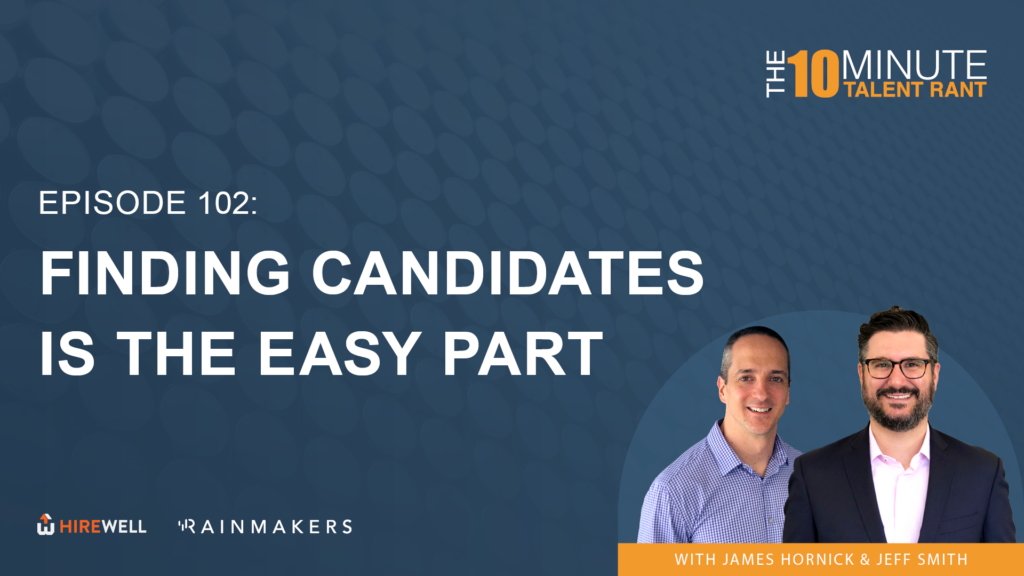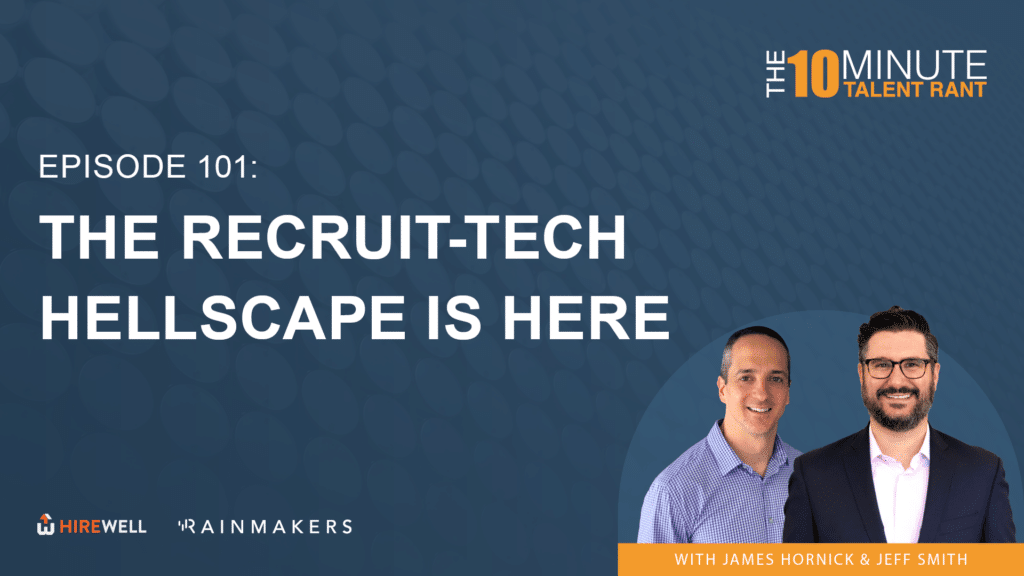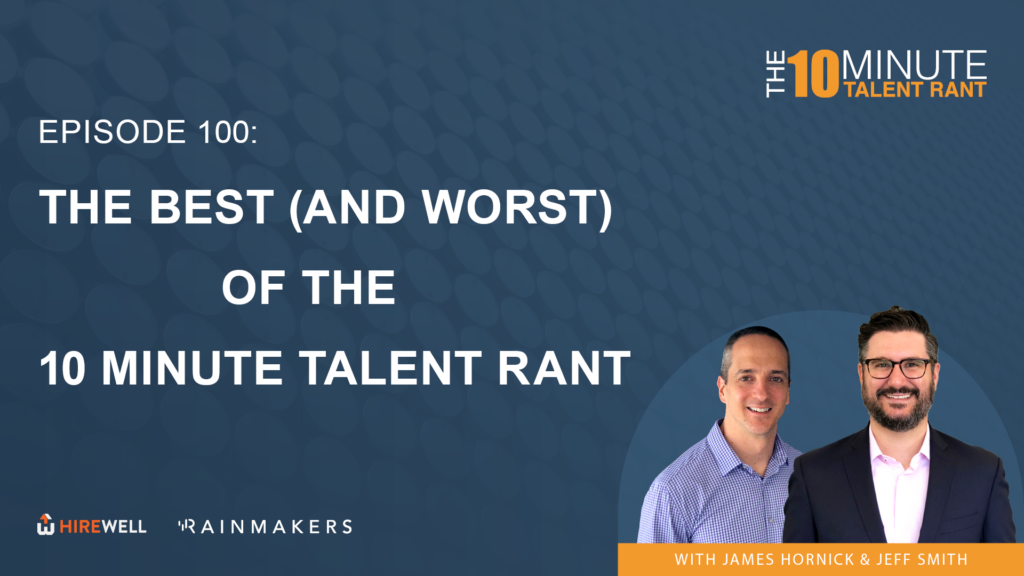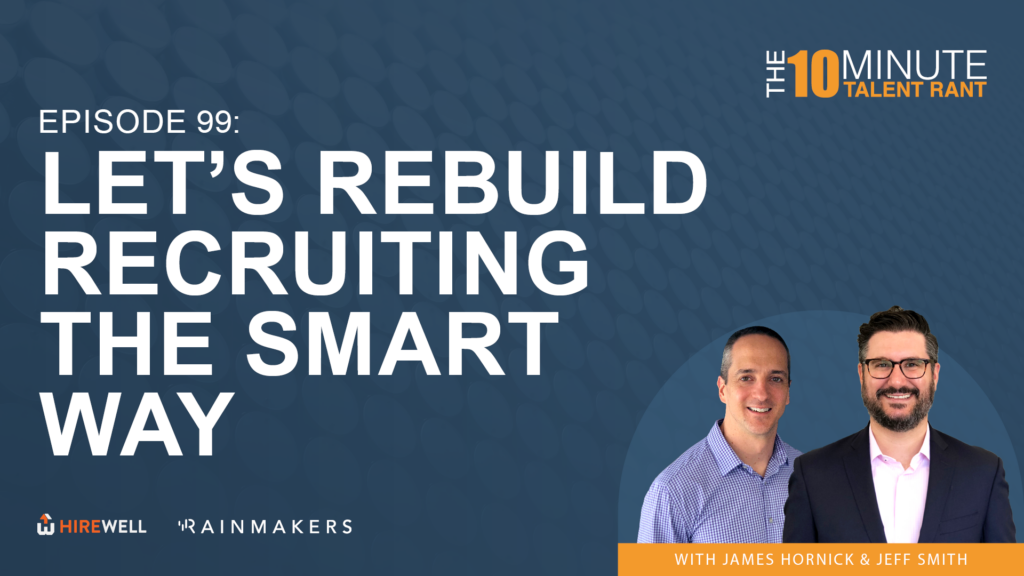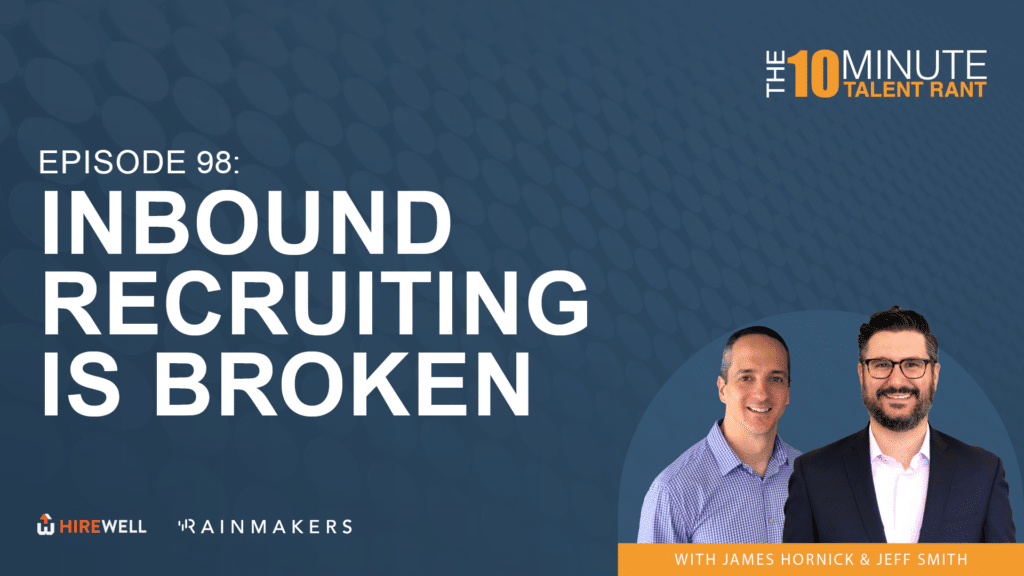The 10 Minute Talent Rant is live. I’m James Hornick, joined by Jeff Smith and we are on the clock. The 10 Minute Talent Rant is our ongoing series where we break down things that are broken in the talent acquisition and hiring space, maybe even pitch a solution or two. Before we dig in, all of our content can be found on talentinsights.hirewell.com.
This week’s topic, episode 72, “Giving job seekers bad news sucks”. It does. I decided to wear a collared shirt and comb my hair for today, for those of you who are wondering who this individual is. Yeah. That was because of this show. Nothing else you have going on today. Yeah, that’s right.
Strictly for internet show. So I think we should, we need to acknowledge the hate around this topic and job seeking is one of the most stressful and frustrating things a human can really go through. You’re going to get told no a lot. You’re going to hit a point where you just want to just strangle the messenger, which is the recruiter most of the time,
if there is a messenger. Then sprinkling the fact that I think a lot of recruiters inherently do not know how to do the job that job seekers themselves do, you know. If you’re a recruiter and you’re talking an engineer, you don’t actually know what, you can’t actually do their job and, unless you’re actually trying to recruit for a recruiter.
And when you give someone bad news about their own performance and they know that you don’t know how to do what they do, that’s also going to kind of wear on them a bit too. Yeah. But the purpose of today’s rant is we want to address the elephant in the room is that a lot of recruiters, even good ones, are afraid to give people honest feedback.
Every recruiter you know has been absolutely verbally abused by someone multiple times, bunch of times, people who just did not respond well to rejection and feedback and took it out on them. And I don’t care who you are, that is going to affect the next interaction you have with the next candidate when it’s time to give them feedback.
Yeah. People are going to say, maybe see that and say, or hear that comment, “Well that’s your job”. We’re humans just like everybody else. It sucks to hear the information, but it’s also really hard to have to say something difficult to somebody and have it not received well. So newsflash, you’re not going to be a fit for every job.
Basically the too long getting real of the entire show, right? Yeah. Good recruiters know what the customers are looking for. So these are the people we’re interacting with every day. We, by and large know what we’re talking about when we’re going to market. We will relay that to you. And like, honestly, we’re having five plus conversations like this a day. And if three of them get even remotely spicy, it’s just a huge emotional drain. It becomes hard to do the job on a day-to-day basis. So, that’s on top of the general drain of just the job overarchingly and it just, the culmination of it just gets really hard,
so. Yeah. I don’t want this to be a rant on like, oh, woe is me the tribalism of, you know, recruiter’s good, job seekers bad, but let’s look at the human nature of this. People react poorly to things that they don’t want to hear and when they’re overwhelmed with stress in what you said, which is one of your big life decisions, like changing or finding a job.
Mm-hmm. When you’re struggling to pay bills and we know you are out there and someone tells you no, you might say things that you shouldn’t say. Understandable. Mm-hmm. I mean, I’ve known kind people morph into that like yell at the waiter types in the wrong instances. It happens. But once you, and by you, we’ve been lit up by a total stranger that we’re trying to help,
it’s just simply not something I want to experience again. And that’s why feedback can go from being direct and constructive to very, very minimal and unhelpful. So we do have some feedback and some takeaways on this. The first thing I feel like I need to say is like temper expectations. On a macro level, there’s no true fix for this.
This is, cognitive dissonance and emotional responses and conflict avoidance, it’s all stuff that’s just hardwired into our nature as human beings. So kind of temporary expectations there. But on an individual level, we do have suggestions for recruiters and things they can do because I do- because we’re talking to the recruiters that actually care that want to make a difference because the great recruiters out there want to make job seekers better.
They want to help them and make sure they can give impactful, they want to build relationships, but they also want to make them more successful next time out. So we do have five or six kind of takeaways specific to that. I hope you’ll take these things, kind of listen to them, take them in. Maybe this will help you kind of do this and reduce your own stress, but also still help people out.
But I do want to say, this is not a problem that’s permanently fixable. It’s not like solving a process, just Zoom tech technology’s going to come out. It’s just- it’s just people, man. So some of these, I did post about this last week. We actually got a lot of good feedback from people had their own thing or own suggestions.
So I think Sarah Brecklemen mentioned something. Her standard of practice is first just asking, are you open to feedback? No matter, like no one says no to that. But she mentioned, and I have actually done this before, it definitely opens the door to more constructive conversation. Even if people are going to react negatively, they’re at least aware it’s top of mind that they’ve already said they wanted feedback and they might check themselves a little bit and be a little more kind of open to whatever it is you have to say.
So that’s number one. Yeah. When they put this comment out there, kudos, Sarah. I mean, I learned something from that. I had never employed this and it just number two is being direct and transparent is super important, but the communication, it has to be framed the right way. So all of this revolves around empathy and the human condition, what you just said.
And having that empathy for the person receiving the disappointing news is super key. They’re the ones that are absorbing. They’re the ones seeking the job. They’re the ones that are getting the feedback, the news that they’re not going to be getting the job. And so again, the way in which we’re conveying this matters and it’s really important to set that stage so that it isn’t combative.
All right, number three. You have to be prepared for this conversation the same way that a candidate would be preparing for an interview. I know what it’s like to be overwhelmed and have too many tasks on your list and to just motor through whatever you’re trying to do, but you have to take a moment, make sure whoever you’re talking to- because I have seen this bunch of times where there’s a lot of candidate rejections that are going out,
people get the feedback confused, they start saying the wrong thing to the wrong person. Pull up their resume again. Pull up their LinkedIn profile again, review it again. Make sure you’ve got the notes from the hiring manager, whoever it was, not just reading them out back to the person, but you actually understand them and can comprehend them, and can communicate them accurately.
The last thing you want is for them to realize that what you’re saying is bullshit because that couldn’t be the feedback about me, that must be confused, you must be thinking of someone else, or you know, someone maybe have this, you might have two candidates with the same first name and you’re kind of confusing things because of that.
You just need to make sure you actually know exactly who you’re talking to, what the true feedback is, you wrap your own head around it, it makes sense to you before you tell it to them. Because I see this a lot and I really think it’s one of the main things that makes feedback terrible, is that the recruiter for that moment in time just half-assed it, whatever the feedback was passed through to them.
Totally. It’s the whole going through the motions. Yeah. And it’s so easy to sniff out. We had a great suggestion from Michelle Mehlis, frequent contributor. She’s on our squad. Again, a learning opportunity for me, when sending feedback via email which sometimes we have to do for whatever reason,
she almost always uses, starts with the word- uses the word disappointing and she revolves it around “Thank you for the time. Thank you for everything that you’ve done to invest yourself. I’m writing with disappointing news.” Like what a powerful statement. Mm-hmm. And it sets that tone and in the right way.
And she keeps it very fact-based. The reasons being there was lots of interest in the role, and yes, you were a good fit, but others were too. Going back to, you know, you’re not going to be the absolute best for every single role even if you fit those qualifications. Maybe you’re missing a qualification.
Maybe you’re in the wrong size of organization or industry. Laying out the facts. But I really liked that starting like, yes, I have disappointing news and I’m going to give you reasons why. Number five, and I think I just- oh, go ahead. One quick aside of that, because there is a difference between, on some level we have to acknowledge that hiring managers are going to make decisions.
Some of it’s based on their opinions, which are always going to be tough to take. But there are things that are going to be based on facts as well too, such as having less qualifications than the other person coming from a certain type of organization, like those types of things. And making sure you can actually demonstrate and talk about the factual based things not just what someone’s opinion was.
So, sorry. Yeah, no, no, that’s a great point. And that’s the, that’s the really hard stuff to articulate because then it gets into you’re talking about people’s subjective opinion of their personality. Don’t need to get into that. That’s probably a whole nother rant. Number five, most companies, especially large companies, don’t want to give real feedback due to the concerns of being sued. And yes, it could take one hiring manager within the company’s history to say something inappropriate and that creates a big backlash.
When we were prepping for this I kind of was like, you know, I hear this all the time, but I haven’t really heard of tons of situations where companies are actually getting sued for this, but the perception from the company, from the interviewer side, doesn’t change. Right? I mean, that’s still a constant problem that lots of companies are like, oh God, we’re going to get sued if we say something ridiculous.
I think a big differentiator here would be, if a company was able to create a policy that they could socialize externally to the candidate population, that someone from the hiring team would actually give real time face-to-face feedback after X amount of interviews, I think that would be a, that’d be a big at value add for the entire experience.
Yeah. I don’t know of a company that does that, and if you are a company that does that, we’d love to hear about it. Everyone should be getting feedback as a common courtesy for investing their time but it’s far more loaded than most people understand for the reasons that I just expressed. So if your managers can give good feedback to the companies out there, do it.
But you know, if they’re not trained well, it can be a pretty dangerous proposition. Yeah. And the last thing I’ll say, and this is a reminder for job seekers- if you do catch yourself blowing up on a recruiter, you just validated the decision they had to not hire you. So just keep that in mind. I realize it’s tough.
It’s just that you have to realize that keep your emotions in check. If you get bullshit feedback, I’m not justifying that either, but you know, just you’re adding fuel to the fire for the next candidate who and who doesn’t get feedback from that recruiter because they’re still gun shy from their conversation they had with you.
So anyways. Yep. We’re short on clock. That’s a wrap for this week. Thanks for tuning in the 10 Minute Talent Rant, part of the Talent Insights series which is always available for replay on talentinsights.hirewell.com as well as YouTube, Apple Podcast, Google Podcast, Spotify and Amazon. Jeff, thanks again as always. Everyone out there, we will see you soon.







